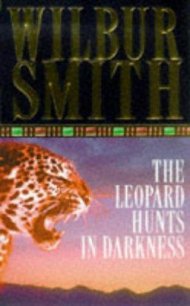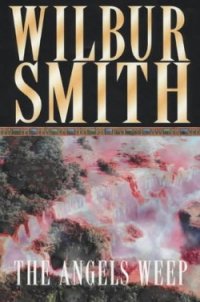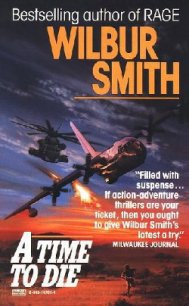Eagle in the Sky - Smith Wilbur (книги серия книги читать бесплатно полностью .txt) 📗
No, said David. If you aren't there this afternoon, they won't approve
the new fencing allocations. I'll go on my own.
Debra was working at her desk when she heard the wind coming. She
switched off her tape recorder and went out on to the veranda with the
dog following her closely.
She stood listening, not sure of what she was hearing.
It was a soughing and sighing, a far-off rushing like that of a wave
upon a pebble beach.
The dog pressed against her leg and she squatted beside him, placing one
arm around his neck, listening to the gathering rush of the wind,
hearing the roar of it building up swiftly, the branches of the morula
forest beginning to thrash and rattle.
Zulu whimpered, and she hugged him a little closer.
There, boy. Gently. Gently, she whispered and the wind struck in a
mighty squalling blast, crashing through the treetops, tearing and
cracking the upper branches.
It banged into the insect screen of the veranda with a snap like a
mainsail filling, and unsecured windows and doors slammed like cannon
shots.
Debra sprang up and ran back into her workroom, the window was swinging
and slamming, dust and debris boiling in through it. She put her
shoulder to it, closing it and securing the latch, then she ran to do
the same to the other windows and bumped into one of the house servants.
Between them they battened down all the doors and windows. Madam, the
rain will come now. Very much rain. 'Go to your families now, 'Debra
told them. The dinner, madam? Don't worry, I'll make that, and
thankfully they streamed away through the swirling dust to their
hutments beyond the kopje.
The wind blew for fifteen minutes, and Debra stood by the wire screen
and felt it tugging and whipping her body. Its wildness was infectious,
and she laughed aloud, elated and excited.
Then suddenly the wind was passed, as swiftly as it had come, and she
heard it tearing and clawing its way over the hills above the pools.
In the utter silence that followed the whole world waited, tensed for
the next onslaught of the elements.
Debra felt the cold, the sudden fall in temperature as though the door
to a great ice-box had opened and she hugged her arms and shivered; she
could not see the dark cloud banks that rolled across Jabulani, but
somehow she sensed their menace and their majesty in the coldness that
swamped her.
The first lightning bolt struck with a crackling electric explosion that
seemed to singe the air about her, and Debra was taken so unawares that
she cried out aloud. The thunder broke, and seemed to shake the sky and
rock the earth's very foundations.
Debra turned and groped her way back into the house, locking herself
into her room, but walls could not diminish the fury of the rain when it
came. It drummed and roared and deafened, battering the window panes,
and striking the walls and doors, pouring through the screen to flood
the veranda.
As overpowering as was the rainstorm, yet it was the lightning and the
thunder that racked Debra's nerves.
She could not steel herself for each mighty crack and roar. Each one
caught her off balance, and it seemed that they were aimed directly at
her.
She crouched on her day bed, clinging to the soft warm body of the dog
for a little comfort. She wished she had not allowed the servants to
leave, and she thought that her nerve might crack altogether under the
bombardment.
Finally she could stand it no longer. She groped her way into the
living-room. In her distress she had almost lost her way about her own
home, but she found the telephone and lifted it to her ear.
Immediately she knew that it was dead, there was no tone to it but she
cranked the handle wildly, calling desperately into the mouthpiece,
until finally she let it fall and dangle on its cord.
She began to sob as she stumbled back to her workroom, hugging the child
in her big belly, and she fell upon the day bed and covered her ears
with both hands.
Stop it, she screamed. Stop it, oh please God, make it stop.
The new national highway as far as the coal-mining town of Witbank was
broad and smooth, six lanes of traffic, and David eased the hired
Pontiac into the fast lane and went flat, keeping his foot pressed down
hard.
She peaked out at a hundred and thirty miles an hour, and she sat so
solid upon the road that he hardly needed to drive her. His mind was
free to play with horror stories, and to remember Johan Akkers face as
he stood in the dock glaring across the Court Room at them. The
deep-set muddy eyes, and the mouth working as though he were about to
spit. As the warders had led him to the stairs down to the cells he had
pulled free and shouted back.
I'm going to get you, Scarface, he giggled. If I have to wait
twenty-nine years, I'm going to get you, and they took him away.
After Witbank the road narrowed. There was heavy traffic and the bends
had dangerous camber and deceptive gradients.
David was able to concentrate on keeping the big car on the road, and to
drive the phantoms from his mind.
He took the Lyndenburg turn off, cutting the corner of the triangle, and
the traffic thinned out to an occasional truck. He was able to go flat
out again, and race along the edge of the high escarpment. Then
suddenly the road turned and began its plunge down into the low veld.
When he emerged from the Erasmus tunnel David ran into the rain. it was
a solid grey bank of water that filled the air and buffeted the body of
the Pontiac. It flooded the road, so David had difficulty following its
verge beneath the standing sheets of water, and it swamped the
windshield, so that the efforts of the wipers to clear it were defeated.
David switched on his headlights and drove as fast as he dared, craning
forward in his seat to peer into the impenetrable blue-grey curtains of
rain.
Darkness came early in the rain, beneath the lowering black clouds, and
the wet road dazzled him with the reflections of his own headlights,
while the fat falling drops seemed as big as hailstones. He was forced
to moderate his speed a little more, creeping down the highway towards
Bandolier Hill.
In the darkness he almost missed the turning, and he reversed back to
it, swinging on to the unmade surface.
It was slushy with mud, puddled and swampy, slippery as grease.
Again he was forced to lower his speed.
Once he lost it, and slid broadside into the drainage ditch. By packing
loose stones under the wheels and racing the engine he pulled the
Pontiac out and drove on.
By the time he reached the bridge over the Luzane stream, he had been
six hours at the wheel of the Pontiac, and it was a few minutes after
eight o'clock in the evening.
As he reached the bridge the rain stopped abruptly, a freak hole in the
weather. Directly overhead the stars showed mistily, while around them
the cloud banks swirled, turning slowly, as though upon the axis of a
great wheel.
David's headlights cut through the darkness, out across the mad brown
waters to the far bank a hundred yards away. The bridge was submerged
under fifteen feet of flood water, and the water was moving so swiftly
that its waves and whirlpools seemed sculptured in polished brown
marble, and the trunks of uprooted trees dashed downstream upon the
flood.
It seemed impossible that the bed of this raging torrent had been the




